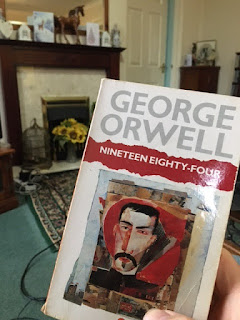Orwell's narrative unfolds in Airstrip One, a province of the superstate Oceania, where the ruling Party, led by the enigmatic figure Big Brother, employs manipulation and control to subjugate the masses. The protagonist, Winston Smith, becomes a symbolic pawn in this totalitarian game, a victim of the Party's relentless pursuit of power and dominance.
One can draw a connection between the oppressive regime in "1984" and the calculated risk inherent in the world of gambling. In both scenarios, individuals find themselves entrapped in a system that controls their actions, limiting their agency and autonomy. In the world of Oceania, citizens are subjected to constant surveillance through telescreens, mirroring the watchful eyes of a casino, where cameras capture every move at the gaming tables. The parallel suggests that, much like a gambler navigating the casino's confines, citizens in Oceania navigate their lives within the suffocating constraints of the Party's ideology.
In the novel, the Party manipulates language through Newspeak, a controlled and simplified version of English designed to eliminate unorthodox thoughts. This linguistic oppression serves as a tool for the Party to control not only what people say but also what they can think. Similarly, in the world of gambling, the language used within the industry can shape perceptions and influence behavior. Terms like "house edge" and "gambler's fallacy" subtly guide individuals towards the inevitability of losses, reinforcing the idea that the system is designed for the benefit of the house.
The concept of doublethink, another key element in "1984," is the ability to hold two contradictory beliefs simultaneously and accept both of them. This cognitive dissonance is a form of mental oppression that serves the Party's agenda. In the realm of gambling, individuals often grapple with a similar internal conflict – the simultaneous desire for both risk and security. The thrill of placing a bet, the hope for a big win, clashes with the sobering reality of potential losses. The gambler, like the citizen of Oceania, is caught in a perpetual struggle between conflicting desires, manipulated by external forces beyond their control.
Orwell's exploration of oppression in "1984" also aligns with the psychology of addiction, a phenomenon prevalent in both the dystopian society and the world of gambling. The Party keeps the populace subdued through a cycle of fear, propaganda, and perpetual war, much like how the gambling industry perpetuates a cycle of risk, reward, and loss. The parallel highlights the insidious nature of control, whether through overt political oppression or the more subtle mechanisms of addiction.
In conclusion, George Orwell's "1984" serves as a chilling warning about the dangers of unchecked power and the erosion of individual freedom. By drawing parallels to the world of gambling, one can discern a shared theme of oppression, where individuals navigate systems designed to manipulate and control. Orwell's timeless work continues to be a stark reminder of the fragility of human autonomy and the consequences of surrendering personal agency to oppressive forces. As we reflect on the dystopian nightmare of "1984," we are prompted to question our own societies and systems, ensuring that the gamble for freedom is never lost.
Photo: Pixabay (free)
Photo: J.Coote (2023)



No comments:
Post a Comment
Note: only a member of this blog may post a comment.